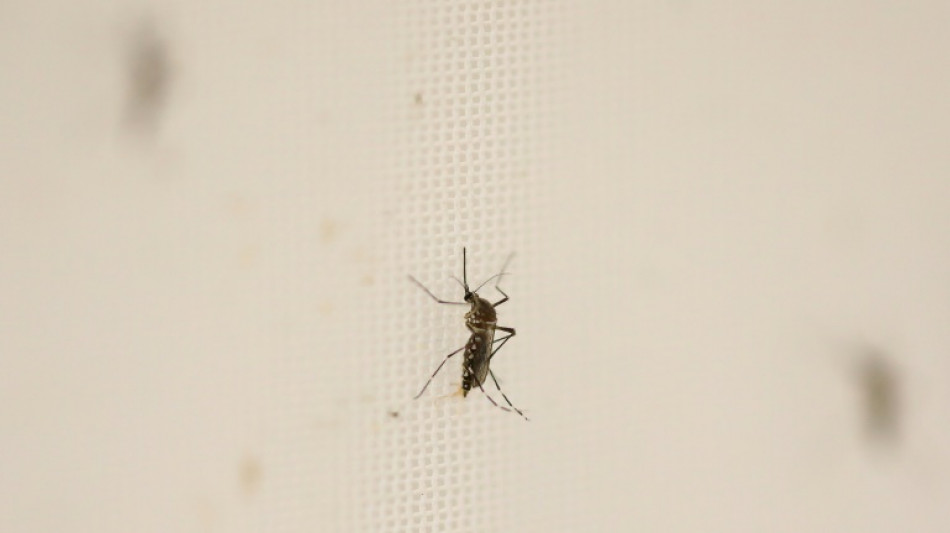
-
 Naib's fifty lifts Afghanistan to 182-6 against New Zealand
Naib's fifty lifts Afghanistan to 182-6 against New Zealand
-
Paul Thomas Anderson wins top director prize for 'One Battle After Another'

-
 De Beers sale drags in diamond doldrums
De Beers sale drags in diamond doldrums
-
NFL embraces fashion as league seeks new audiences

-
 What's at stake for Indian agriculture in Trump's trade deal?
What's at stake for Indian agriculture in Trump's trade deal?
-
Real Madrid can wait - Siraj's dream night after late T20 call-up

-
 Castle's monster night fuels Spurs, Rockets rally to beat Thunder
Castle's monster night fuels Spurs, Rockets rally to beat Thunder
-
Japan votes in snow-hit snap polls as Takaichi eyes strong mandate

-
 Pakistan's capital picks concrete over trees, angering residents
Pakistan's capital picks concrete over trees, angering residents
-
Berlin's crumbling 'Russian houses' trapped in bureaucratic limbo

-
 Neglected killer: kala-azar disease surges in Kenya
Neglected killer: kala-azar disease surges in Kenya
-
Super Bowl set for Patriots-Seahawks showdown as politics swirl

-
 Sengun shines as Rockets rally to beat NBA champion Thunder
Sengun shines as Rockets rally to beat NBA champion Thunder
-
Matsuyama grabs PGA Phoenix Open lead with Hisatsune one back

-
 Washington Post CEO out after sweeping job cuts
Washington Post CEO out after sweeping job cuts
-
Haiti's transitional council hands power to PM

-
 N. Korea to hold party congress in February, first since 2021
N. Korea to hold party congress in February, first since 2021
-
Thailand votes after three leaders in two years

-
 Swiss joy as Von Allmen wins first gold of Winter Olympics
Swiss joy as Von Allmen wins first gold of Winter Olympics
-
George backs England to 'kick on' after Six Nations rout of Wales

-
 Malinin upstaged as Japan keep pressure on USA in skating team event
Malinin upstaged as Japan keep pressure on USA in skating team event
-
Japan's Kimura soars to Olympic gold in snowboard big air final

-
 Vail's golden comets Vonn and Shiffrin inspire those who follow
Vail's golden comets Vonn and Shiffrin inspire those who follow
-
Veteran French politician loses culture post over Epstein links

-
 Japan's Kimura wins Olympic snowboard big air gold
Japan's Kimura wins Olympic snowboard big air gold
-
Arteta backs confident Gyokeres to hit 'highest level'

-
 Hojlund the hero as Napoli snatch late win at Genoa
Hojlund the hero as Napoli snatch late win at Genoa
-
England's Arundell 'frustrated' despite hat-trick in Wales romp

-
 Lollobrigida skates to first Italian gold of Winter Olympics on her birthday
Lollobrigida skates to first Italian gold of Winter Olympics on her birthday
-
Arundell hat-trick inspires England thrashing of Wales in Six Nations opener

-
 Chile's climate summit chief to lead plastic pollution treaty talks
Chile's climate summit chief to lead plastic pollution treaty talks
-
Rosenior hails 'unstoppable' Palmer after treble tames Wolves

-
 French ex-minister offers resignation from Paris cultural hub over Epstein links
French ex-minister offers resignation from Paris cultural hub over Epstein links
-
New NBA dunk contest champ assured and shooting stars return

-
 Shiffrin says will use lessons learnt from Beijing flop at 2026 Games
Shiffrin says will use lessons learnt from Beijing flop at 2026 Games
-
Takaichi tipped for big win as Japan votes

-
 Lens return top of Ligue 1 with win over Rennes
Lens return top of Ligue 1 with win over Rennes
-
Shiffrin learning from Beijing lessons ahead of Milan-Cortina bow

-
 Demonstrators in Berlin call for fall of Iran's Islamic republic
Demonstrators in Berlin call for fall of Iran's Islamic republic
-
'Free the mountains!": clashes at Milan protest over Winter Olympics

-
 Townsend accepts pressure will mount on him after Italy defeat
Townsend accepts pressure will mount on him after Italy defeat
-
BMW iX3 new style and design

-
 Suryakumar's 84 leads India to opening win over USA in T20 World Cup
Suryakumar's 84 leads India to opening win over USA in T20 World Cup
-
Lollobrigida skates to first Italian gold of Milan-Cortina Games

-
 Barca beat Mallorca to extend Liga lead
Barca beat Mallorca to extend Liga lead
-
Gyokeres lifts Arsenal nine clear as Man Utd pile pressure on Frank

-
 Late Guirassy winner for Dortmund trims Bayern's lead atop Bundesliga
Late Guirassy winner for Dortmund trims Bayern's lead atop Bundesliga
-
'Free the mountains!": protest in Milan over Winter Olympics

-
 Gyokeres double helps Arsenal stretch Premier League lead
Gyokeres double helps Arsenal stretch Premier League lead
-
New Skoda Epiq: modern with range


'Virus hunters' track threats to head off next pandemic
A global network of doctors and laboratories is working to pinpoint emerging viral threats, including many driven by climate change, in a bid to head off the world's next pandemic.
The coalition of self-described "virus hunters" has uncovered everything from an unusual tick-borne disease in Thailand to a surprise outbreak in Colombia of an infection spread by midges.
"The roster of things that we have to worry about, as we saw with Covid-19, is not static," said Gavin Cloherty, an infectious disease expert who heads the Abbott Pandemic Defense Coalition.
"We have to be very vigilant about how the bad guys that we know about are changing... But also if there's new kids on the block," he told AFP.
The coalition brings together doctors and scientists at universities and health institutions across the world, with funding from healthcare and medical devices giant Abbott.
By uncovering new threats, the coalition gives Abbott a potential headstart in designing the kinds of testing kits that were central to the Covid-19 response.
And its involvement gives the coalition deep pockets and the ability to detect and sequence but also respond to new viruses.
"When we find something, we're able to very quickly make diagnostic tests at industry level," Cloherty said.
"The idea is to ringfence an outbreak, so that we would be able to hopefully prevent a pandemic."
The coalition has sequenced approximately 13,000 samples since it began operating in 2021.
In Colombia, it found an outbreak of Oropouche, a virus spread by midges and mosquitoes, that had rarely been seen there before.
Phylogenetic work to trace the strain's family tree revealed it came from Peru or Ecuador, rather than Brazil, another hotspot.
"You can see where things are moving from. It's important from a public health perspective," said Cloherty.
- Difficult and costly -
More recently, the coalition worked with doctors in Thailand to reveal that a tick-bourne virus was behind a mysterious cluster of patient cases.
"At the time, we didn't know what virus caused this syndrome," explained Pakpoom Phoompoung, associate professor of infectious disease at Siriraj Hospital.
Testing and sequencing of samples that dated back as far as 2014 found many were positive for severe fever with thrombocytopenia syndrome (SFTSV).
"Less than 10 patients had (previously) been diagnosed with SFTSV in Thailand... we don't have PCR diagnosis, we don't have serology for this viral infection diagnosis," Pakpoom told AFP.
Diagnosing it "is difficult, labour intensive and also is costly".
And there is a growing need to track these threats as climate change expands the range of infectious disease globally.
The link between climate change and infectious disease is well-established and multi-faceted.
Warmer conditions allow vectors like mosquitoes to live in new locations, more rain creates more breeding pools, and extreme weather forces people into the open where they are more vulnerable to bites.
Human impact on the planet is also driving the spread and evolution of infectious disease in other ways: biodiversity loss forces viruses to evolve into new hosts, and can push animals into closer contact with humans.
- 'You have to be vigilant' -
Phylogenetic analysis of the SFTSV strain in Thailand gives a snapshot of the complex interplay.
It showed the virus had evolved from one tick with a smaller geographic range into the hardier Asian longhorned tick.
The analysis suggested its evolution was driven largely by pesticide use that reduced the numbers of the original tick host.
Once the virus evolved, it could spread further in part because Asian longhorned ticks can live on birds, which are travelling further and faster because of changing climate conditions.
"It's almost like they're an airline," said Cloherty.
Climate change's fingerprints are in everything from record outbreaks of dengue in Latin America and the Caribbean to the spread of West Nile Virus in the United States.
While the coalition grew from work that preceded the pandemic, the global spread of Covid-19 offered a potent reminder of the risks of infectious disease.
But Cloherty fears people are already forgetting those lessons.
"You have to be vigilant," he said.
"Something that happens in Bangkok could be happening in Boston tomorrow."
B.Mahmoud--SF-PST




